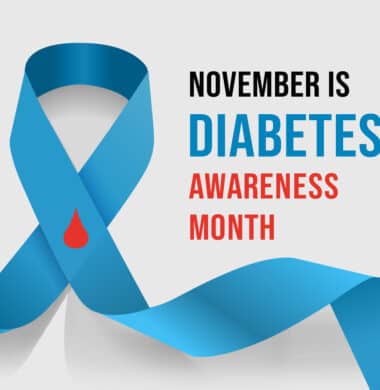Does Diabetes Increase Your Risk of Heart Disease?

Diabetes is a serious condition that can increase your risk of a variety of health issues, including heart disease. Research has shown that individuals with Type 2 diabetes are twice as likely to develop heart disease. In addition, cardiovascular disease is the leading cause of death among individuals with diabetes.
November is National Diabetes Month. There are over 38 million Americans with diabetes and almost 98 million Americans with prediabetes. In addition, the number of Americans with diabetes has more than doubled over the past 20 years. National Diabetes Month seeks to increase public awareness of this condition, the ways it can impact your life, and the steps you can take to reduce your risk of developing diabetes or manage your condition more effectively if you’re currently diabetic.
At South Denver Cardiology, we’re committed to providing our community with the information they need to take control of their heart health. In honor of National Diabetes Month, we’ve created the following overview to help you understand the ways in which diabetes impacts your risk of heart disease.
How Does Diabetes Affect Your Heart?
Over time, the elevated blood sugar levels caused by diabetes can damage the blood vessels and nerves that control your heart. This increases the likelihood of developing fatty deposits in your heart’s blood vessels, which is a primary cause of heart disease. The longer you have diabetes, the greater the chances of developing cardiovascular disease.
There is considerable research detailing the link between diabetes and heart disease:
- Approximately 30% of individuals with Type 2 diabetes also have heart disease
- Diabetics typically develop cardiovascular disease at a younger age than people who don’t have diabetes
- People with diabetes have the same risk of dying from cardiovascular disease as individuals who have already suffered a heart attack
Why Does Diabetes Increase Your Risk of Heart Disease?

- High Blood Pressure – High blood pressure causes blood to flow through your arteries with greater force, which can damage the artery walls.
- High Levels of LDL (“Bad”) Cholesterol – High levels of LDL cholesterol in your bloodstream can cause excess plaque to build up on your artery walls.
- High Triglycerides and Low HDL (“Good”) Cholesterol – High triglycerides combined with low levels of HDL cholesterol can also increase plaque in your arteries.
- Obesity – The insulin resistance caused by diabetes often results in an increased likelihood of obesity, and obesity is a major risk factor of heart disease.
- Kidney Disease – Approximately 40% of diabetics also develop kidney disease. This condition results in damage to your kidneys that prevents them from filtering blood properly.
How to Reduce Your Risk of Heart Disease if You Have Diabetes
Properly managing your diabetes is the most important thing you can do to reduce your risk of heart disease. You can further reduce the risk by living a healthy lifestyle. If you have diabetes, make sure to take the following steps to safeguard your heart:
- Manage Your Diabetes – Take all diabetes medications as prescribed by your doctor.
- Know Your Numbers – Monitor your blood sugar, blood pressure and cholesterol levels to manage these issues and identify changes or trends in your numbers as they occur.
- Eat a Healthy Diet – Eat a diet rich in fruits, vegetables, whole grains, lean protein, beans or legumes, and healthy fats to help manage blood sugar levels and optimize your heart health. Limit your intake of saturated and trans fats, sodium, refined carbohydrates, added sugars and ultra-processed foods since these items can increase your risk of heart disease and make it harder to manage your diabetes.
- Exercise Regularly – Regular exercise will improve your heart health and help control your weight, blood pressure, cholesterol and blood sugar. Aim for at least 150 minutes of moderate intensity exercise per week.
- Maintain a Healthy Weight – Losing excess weight, especially abdominal fat, significantly lowers your risk of heart disease and makes it easier to control your blood sugar levels.
- Test for Heart Disease – Work with a cardiologist to manage your heart health. If you have diabetes, regular diagnostic testing that includes an EKG to measure your heart’s electrical activity, an echocardiogram to examine how well your heart pumps and an exercise stress test to determine how well your heart functions when working hard will help you get a clearer picture of your heart health.
- Quit Smoking – Smoking damages blood vessels and multiplies the effects of diabetes on your heart.
- Limit Alcohol Intake – Excessive alcohol consumption can increase blood pressure and blood sugar.
- Manage Stress – Stress can increase your risk of high blood pressure and lead to unhealthy behaviors, such as overeating or excessive drinking, which increase your risk of heart disease.
South Denver Cardiology Can Help

- Our comprehensive diagnostic testing services will help you monitor your heart health to detect heart disease in its early stages so that you can receive the proper treatment to manage the condition.
- Our Prevention Cardiology Clinic provides comprehensive services that will help you prevent cardiovascular disease and reduce your risk of major cardiac events.
- Our Medical Weight Loss Clinic will help you achieve and maintain a healthy weight that will make it easier to manage your blood pressure, cholesterol levels and diabetes.
- Our nutritional counseling services will help you make smart choices regarding your diet so that you are able to more effectively manage your diabetes and your heart health.
- Our medical fitness gym features a team of exercise specialists who can work with you to develop a customized workout routine that will help you manage your diabetes and optimize your heart health.
Contact us today to schedule an appointment. South Denver Cardiology serves patients in Denver, Littleton and the surrounding areas.
- What Are the Key Components of a Preventive Cardiology Program? - October 31, 2025
- Does Diabetes Increase Your Risk of Heart Disease? - October 24, 2025
- Difference Between Heart Attack and Sudden Cardiac Arrest - October 20, 2025
Sign Up
As with any health concerns, your specific treatment program should be discussed thoroughly with your primary care physician as well as any specialists who may need to be consulted – like a cardiologist.
Sign Up
